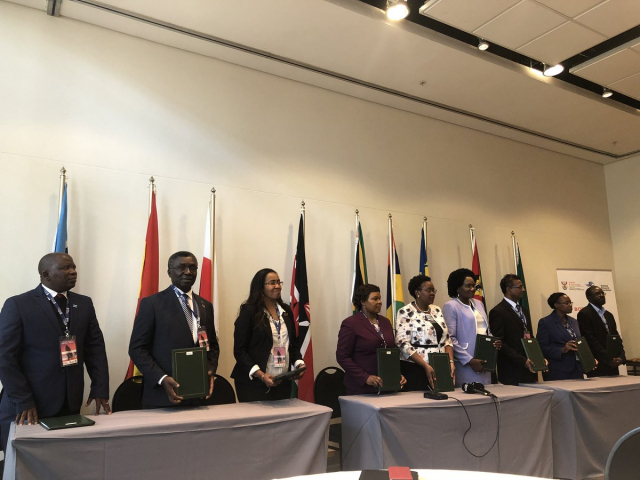
South African Science and Technology Minister Mmamoloko Kubayi-Ngubane says the partner countries in the African Very Long Baseline Interferometry Network (AVN) projects are happy with progress that has been made to prepare for the construction of telescopes in their respective countries.
Kubayi-Ngubane addressed a media briefing shortly after opening the 5th Square Kilometre Array (SKA) and AVN projects African Ministerial Forum meeting in Cape Town on Tuesday.
“We will be issuing a final communiqué at the end of the day once the Ministers have gone through the details and that will include [a response to the question of which country will launch a telescope next]. But we are happy with the number of milestones [that have been achieved],” she said.
The Minister also said that along with the African partner countries, they were also satisfied with the human capital development in those countries and the number of bursaries that had been awarded for Master’s and Doctorate studies in the fields of astronomy.
Following the completion of the 64-dish MeerKAT in the Karoo in the Northern Cape earlier this year, the construction of the second phase of the SKA project, which is set to commence in 2021, is scheduled to be completed in 2026.
The recently-launched telescope in Kuntunse, Ghana, which was converted from a redundant communications antenna into a radio telescope, will be integrated into the African VLBI Network (AVN) in preparation for the second phase construction of the SKA across the African continent.
In the end, the SKA project, which South Africa is co-hosting with Australia, aims to build the world’s largest radio telescope, with eventually over a square kilometre of collecting area that will eventually use thousands of dishes and up to a million low frequency antennas that will enable local and international astronomers to monitor the sky in unprecedented detail and survey the entire sky much faster than any system currently in existence.
Addressing the opening session earlier in the day, Kubayi-Ngubane said the SKA/AVN project is a clear demonstration that member states of the African Union can work together and coordinate science, technology and innovation activities to benefit of the people in the continent.
She said as leaders responsible for science and technology in their respective countries, they have a huge responsibility to ensure that science and technology is placed at the epicentre of achieving the six priorities outlined in the Sustainable Development Goals. This includes eradication of hunger and achieving food security; prevention and control of diseases; communication (physical and intellectual mobility); protection of space; living together and building society; and wealth creation.
She said following the launch of Ghana’s radio telescope, which has already made first light observations, several milestones had been achieved in other African partner countries.
“We have rolled out two-dish interferometers at universities for teaching and training purposes in Botswana and Mozambique as pilots. We have also rolled out about 10-20 computers loaded with software used in radio astronomy in Botswana and Mozambique as pilots.
“We have been able to provide assistance to university astronomy programmes in partner countries through workshops and support to curriculum.
“Lastly, we have initiated an AVN Human Capacity Development Programme, which has supplemented the SKA Human Capacity Development Programme to increase the number of recipients and training opportunities from the SKA/AVN partner countries.
“So far, 136 recipients mainly from African SKA partner countries, have benefited from this initiative, many returning home to initiate radio astronomy programmes at their home universities,” she said.
Benefits of the MeerKAT
Dr Rob Adam, the South African Radio Astronomy Observatory’s managing director, said the MeerKAT has yielded a number of socio-economic benefits for towns surrounding the SKA site in the Karoo.
This includes the construction of a tarred road, a training centre and a community centre that have contributed to skills development, investment in education and health, empowerment of local contractors and human capital development.
Giving a status update of where other partner countries are in terms of preparing for the construction of their telescopes, he said while different countries varied in terms of progress, AVN sites have been assessed in Botswana, Mauritius, Namibia and Kenya, while in Zambia, a site has been secured.
SAnews.gov.za